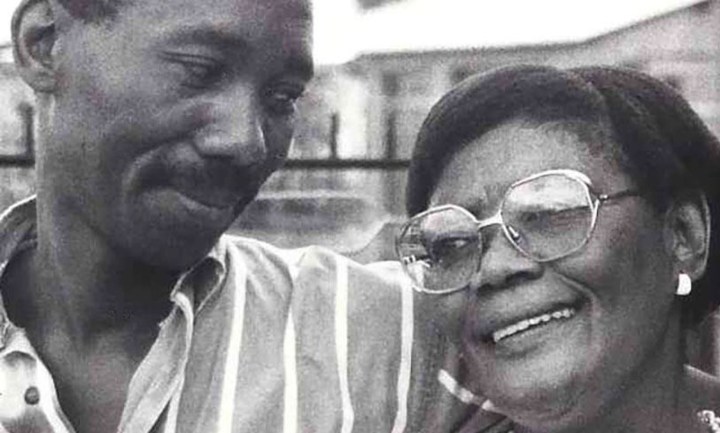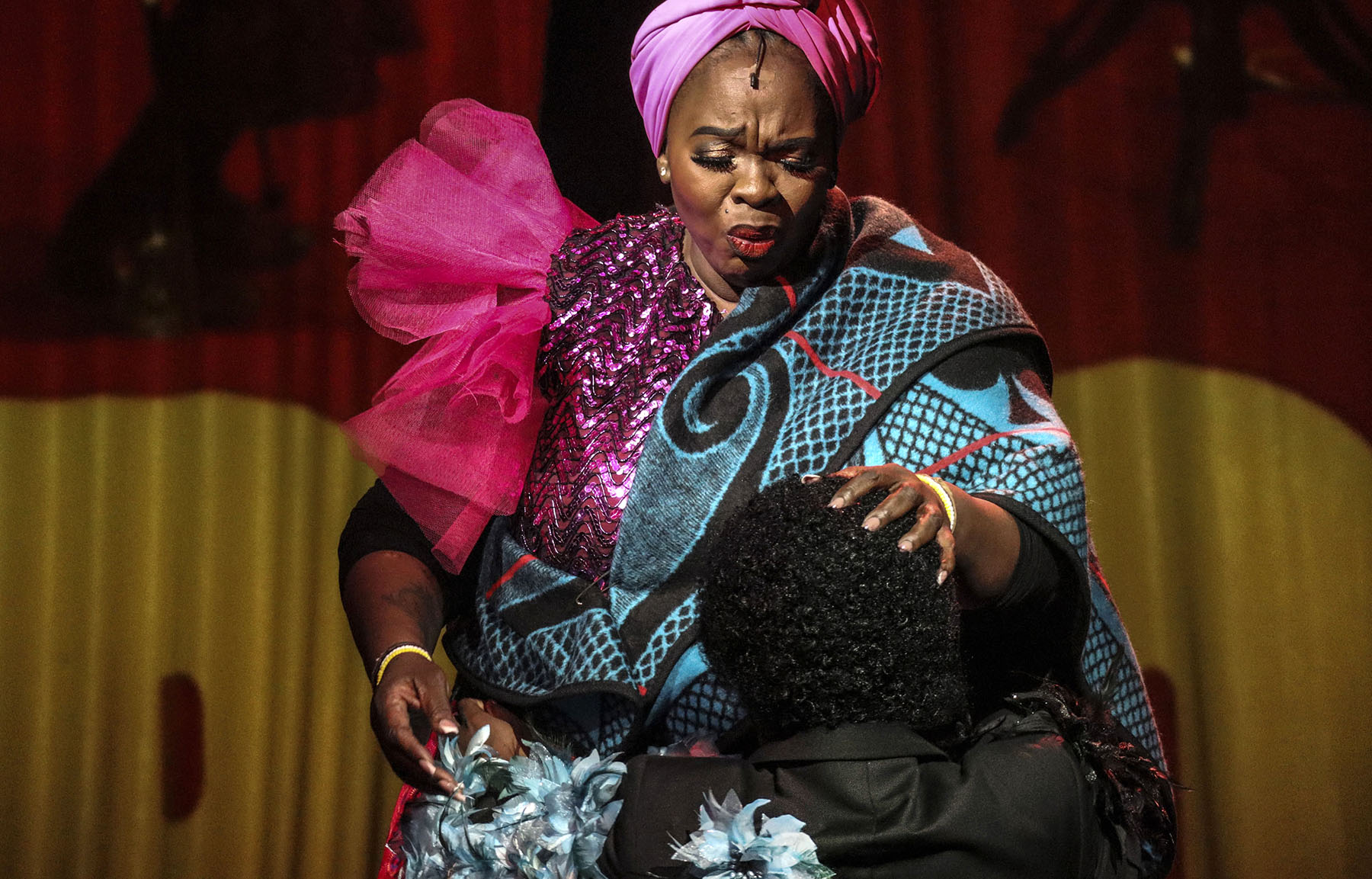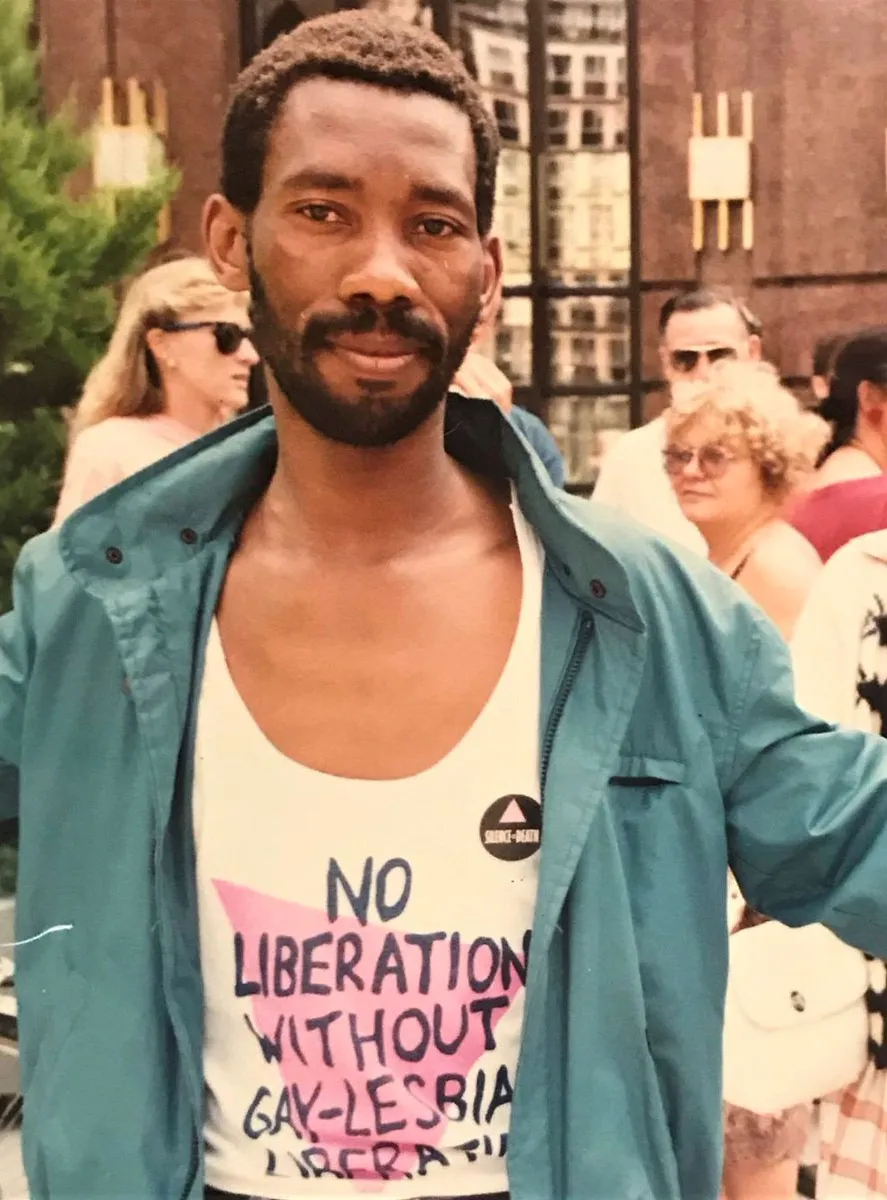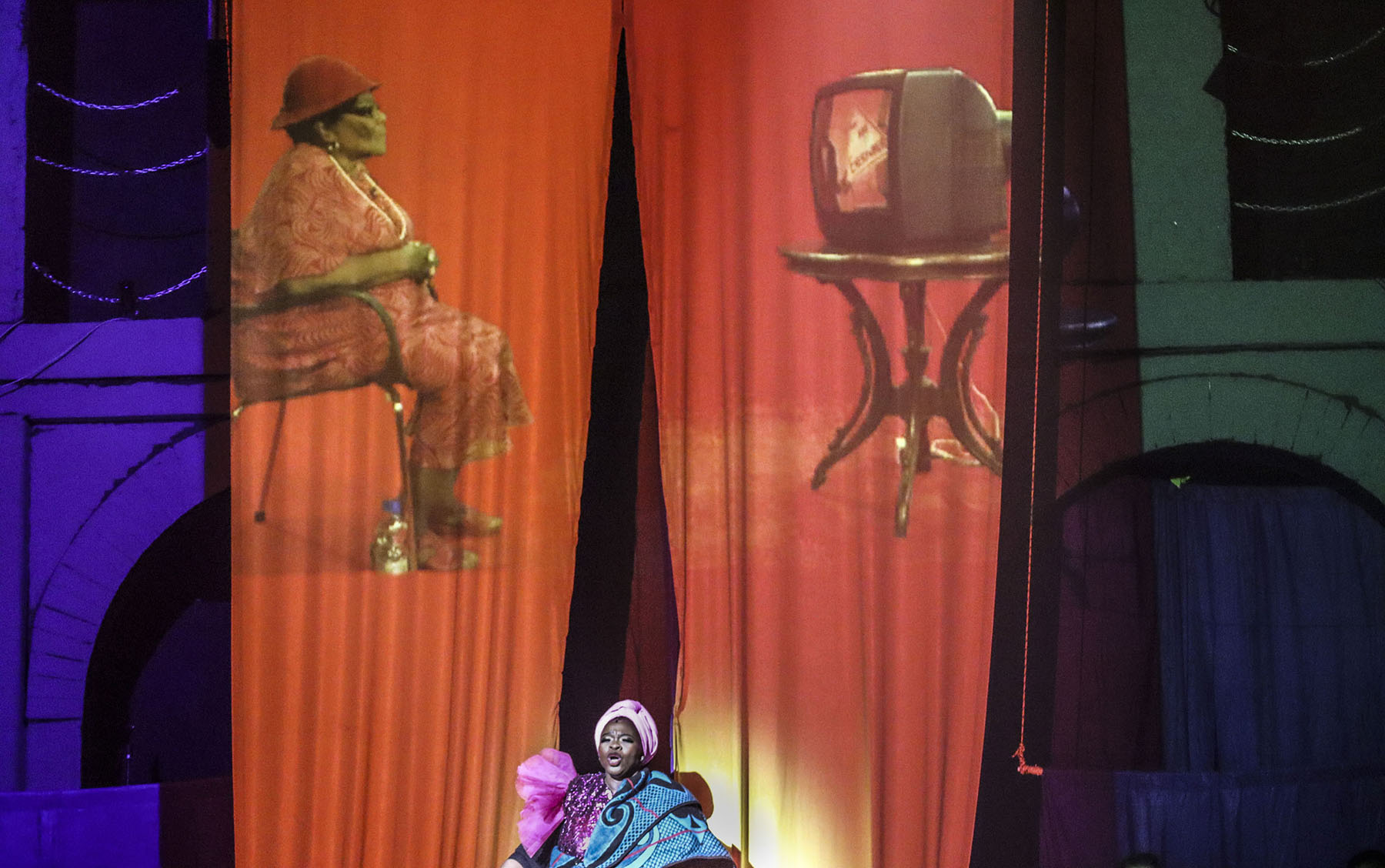DEATH OF A STRUGGLE MUM
Being Simon Nkoli’s mother: Who will remember me?

Elizabeth Nkoli, born on 7 October 1939, died on 24 November 2023. She was the mother of anti-apartheid activist Simon Tseko Nkoli, who was among those charged in the Delmas Treason Trial which ran from 1985 to 1988. Simon fought to ensure that gay rights were enshrined in our Constitution. He died of Aids in 1988. Welcome Lishihva met the activist’s mother while conducting research for Philip Miller’s Nkoli: The Vogue-Opera which premiered at the Market Theatre last month.
Elizabeth Nkoli had four children, three of whom have died – only her daughter, Mamoipone, is left. She was with Elizabeth when her mother passed away.
Lehlohonolo Nkoli, Elizabeth’s grandchild – his father is Simon’s brother, Oupa – told me that he will remember his grandmother as a woman who loved cleanliness and who was both strict and friendly.

In ‘Nkoli: The Vogue Opera’, Ann Masina plays Mrs Elizabeth Nkoli. (Photo: Grace Lewis)
I met Elizabeth Nkoli in 2020 at RealTime Studios in Linden in October 2020 while attending a creative workshop for Nkoli: The Vogue-Opera. She was wearing a smart red dress and matching hat, and while frail, was feisty and very direct.
Read more in Daily Maverick: A life resurrected — an opera about Aids and the life of queer activist Simon Nkoli
My interview with Elizabeth began with a little friendly banter. She asked me if I was gay, like her son, and whether I had a white man in my life. I laughed and said, yes, I was gay, but, no, I didn’t have a man.
She suggested I get myself one (a white man), because he would look after me.
As a committed anti-apartheid activist, Simon Nkoli experienced a fair amount of police brutality. This affected his mother greatly. The police would constantly barge into their home in Sebokeng looking for Simon. If they found him he would be frog-marched to one of the waiting police cars. If they did not find him, she would be threatened with arrest for not controlling her child.
What tormented her most were the threats that when they found him, he would be shot dead.
Gcina Malindi, Simon’s longtime friend, comrade and fellow accused in the Delmas Treason Trial, recalls how Elizabeth Nkoli was known among the comrades as being fierce. She was feared by them all. When Simon was arrested, he had to tell his friend’s parents that their son was in detention.
“I went with other comrades to explain that everything is being done to secure Simon’s release. Simon’s mother would shout at us, ‘But you were together at this meeting, how come my son is detained and you are not?’ She would interrogate me as if I knew where he was being held.
Simon’s father would quietly thank us for letting them know that Si was “safe” in detention. He would nod his head from time to time.
‘Where is my son?’ Elizabeth would shout.”
“He could be at Vereeniging police station; he could be at Vanderbijlpark in Sasolburg; at Protea in Soweto – he could be anywhere. Simon’s mother was difficult in that sense. We went there to explain and be sympathetic, but knowing that we are going to be blamed for why Simon was in detention and we were not.”
Gcina Malindi says this was the same inquisition everyone received from families when their children were detained. “Nevertheless, we had to do it.”
Elizabeth Nkoli saw Malindi as a son especially, after Simon died of Aids in 1998.
Malindi had been friends with Simon since high school.
“I am one of the many comrades in the Vaal who were consistent in showing support for his sexual orientation and support for Simon when he was being harassed by the police.
“I was consistently there with the family, reassuring them that political activism was not something that Si must be dissuaded from pursuing. I was convincing them that the struggle was legitimate and that Simon’s efforts could bring freedom for all of us,” he added.
Elizabeth’s stories reminded me of how incredibly difficult it was for the mothers of student activists who lived in constant fear for their children’s safety. She told me of one of the first times Simon was arrested, and he was sick and admitted to hospital.

Simon Nkoli, a gay anti-apartheid activist who was among those charged in the Delmas Treason Trial which ran from 1985 to 1988. (Photo: Supplied)
“When I got to the hospital… goodness! I have never seen such a painful thing! Buti’s lips were peeled, he had blemishes, and he looked like he was in such pain. What I saw in the hospital hurt me so much.
“From that day onward, every Tuesday and Wednesday, they would fetch me to see him at Hillbrow. He lost weight. He had suffered a lot. Just imagine how it hits you as a parent,” she said.
Being Simon’s mum
Like so many parents of lesbian, gay, trans or intersex children I know of, Elizbeth initially struggled to accept Simon’s homosexuality. She was even determined to get him “cured”, sending him to the local priest, then a sangoma and finally a therapist.
But when we met in 2021, she seemed more accepting. I asked her how she felt about her son’s sexual orientation.
She said, “I did not know what God had planned for him when he was brought to this world. So I just accepted him as he was… as long as he still regarded me as his parent. He still respected us and there is nothing that he did that showed disrespect to us at all. But I used to wonder why he was so inclined to play with girls. I would say, ‘So you are playing with her. It looks like she is going to be my daughter-in-law’.
“He would reply, ‘No, mummy, she is just my friend’.”
Elizabeth continued: “At times I’d find him with a skirt on and ask myself, ‘Why?’ only to find that he is feminine. It took me a long time to realise that. But, man, what can I do? As long as he respected me… that I am his parent. That’s all that mattered.”
Elizabeth’s own life wasn’t without challenges. She lost her husband in the same year that Simon was arrested in 1985.
“When he was arrested for treason in Delmas, I was already in mourning for his father’s death,” Elizabeth recalled.
“They were arrested together with Gcina. I only saw him after months and months. They came to me at work and asked if I wanted to see my child. I said, ‘Yes, of course, I want to see him! Where is he?’
“They asked if I knew the Vereeniging Police Station. No, I didn’t know where it was. I was confused by then. My husband had recently passed away and now my son was arrested. The Afrikaner police took me in a car which was driving at such a high speed. When we got there, they brought him in, chained, so I could talk with him.
“They said we should not talk Sesotho, but English. I said. ‘No way! Even though we know how to speak English, we don’t converse in English because we are Sotho-speaking people. Let your guard interpret what we are saying’.”
While in prison, Simon wrote many letters to friends, his lawyer, comrades, pen pals and his mother. Elizabeth told me she once received a letter neatly written on toilet paper. Simon was asking her to visit him in prison.
This is one of the letters he wrote to his mother:
Dear Mother,
I was so excited when I received the food parcel. Four security cops from Krugersdorp took me to the doctor. I had forgotten I had pretended to be sick. However, it was nice to be in the outside world. I cried when I saw the Joburg skyline and I thought of you, mother. I hope God will hear my prayers and that all the detainees will be charged or released. One day, South Africans shall enjoy the wealth of this country. Love Simon.
Elizabeth eventually accepted Simon’s homosexuality, and told me what she remembered most about her son was that he was an incredibly kind child who liked to help others.
“I remember the very first year we arrived at Sebokeng,” she said.
“The houses were situated in such a way that we used to pass through each other’s houses. There came a bloodied man and he fell a short distance from my yard. Simon went over to him and called an ambulance. I don’t know where he got the phone. He got into the ambulance with the man and went to Sebokeng Hospital. When he got back, he said, ‘Mum, I even got him into the ward’.”
The intersection of dreams
Elizabeth Nkoli had to contend with a society that was unaccepting of her child’s sexual orientation and a political system that did not accept Simon’s fight for freedom. But she never rejected her son. She fiercely supported him, even though she couldn’t fully understand why he was so different.
I am also deeply pained to remember how, in the interview, she told me that one of the things that made her sad about Simon’s death was the promises he had made to give her a better life.
Simon died, leaving her alone and struggling. I’ve thought many times since meeting her how it must have hurt Simon to see the conditions she had to live under in Sebokeng, where residents today still struggle for basic needs.
Elizabeth Nkoli gave us a hero who fought to ensure our liberation, and we will forever be indebted to her for the legacy she has left us. Her difficult circumstances towards the end of her life are indicative of the broader socioeconomic challenges that Simon fought against, which continue to persist.
Simon’s mother never got to share in the wealth of this country, as Simon had fought and hoped for.
Elizabeth was laid to rest on Saturday, 2 December at the AME Church in Sebokeng.
Her neighbours, friends, former work colleagues and fellow congregants, including the priest, remembered her as a direct and “well-put-together lady” who never liked mixing colours and was never afraid of speaking up to her managers at work.
It was clear to me, listening to everyone talk about her uncompromising nature, why Simon was as self-assured and determined to stand up for things as he was. He learnt it from his mother.
It is devastating that Elizabeth died only a week after the premiere of Nkoli: The Vogue-Opera. She was meant to attend the opening of the show, but wasn’t feeling well and declined.
Read more in Daily Maverick: Icon Simon Nkoli gets the glamour treatment
So Gcina Malindi and Harriet Perlman, the Nkoli: Vogue-Opera producer, arranged to visit Elizabeth the following Friday to pay tribute to her and tell her how the show went. They were on their way to Sebokeng when they received the news that she had passed away that morning.
“It was a difficult drive, from looking forward to seeing her to learning about the news of her death on our way there,” said Malindi.
“Instead of celebrating with her, we arrived to join the mourners.”

Against a backdrop of an image of Mrs Elizabeth Nkoli, Ann Masinga sings ‘Who Will Remember Me’. (Photo: Grace Lewis)
Perlman said: “In Nkoli: The Vogue-Opera, Ann Masina, who plays Simon’s mother, sings a most beautiful aria, Who Will Remember Me? to Philip’s haunting music.
“This is the most fitting tribute we can pay to Elizabeth Nkoli.”
Buti, I watched you on TV like I watched you
When you wore my dresses and shoes.
I was quiet then for you.
Am I not the mother who gives birth to her son?
What about all the mothers
Who waited nights
Kept vigil
Hopola, (remember)
All of us. DM




















Comments - Please login in order to comment.